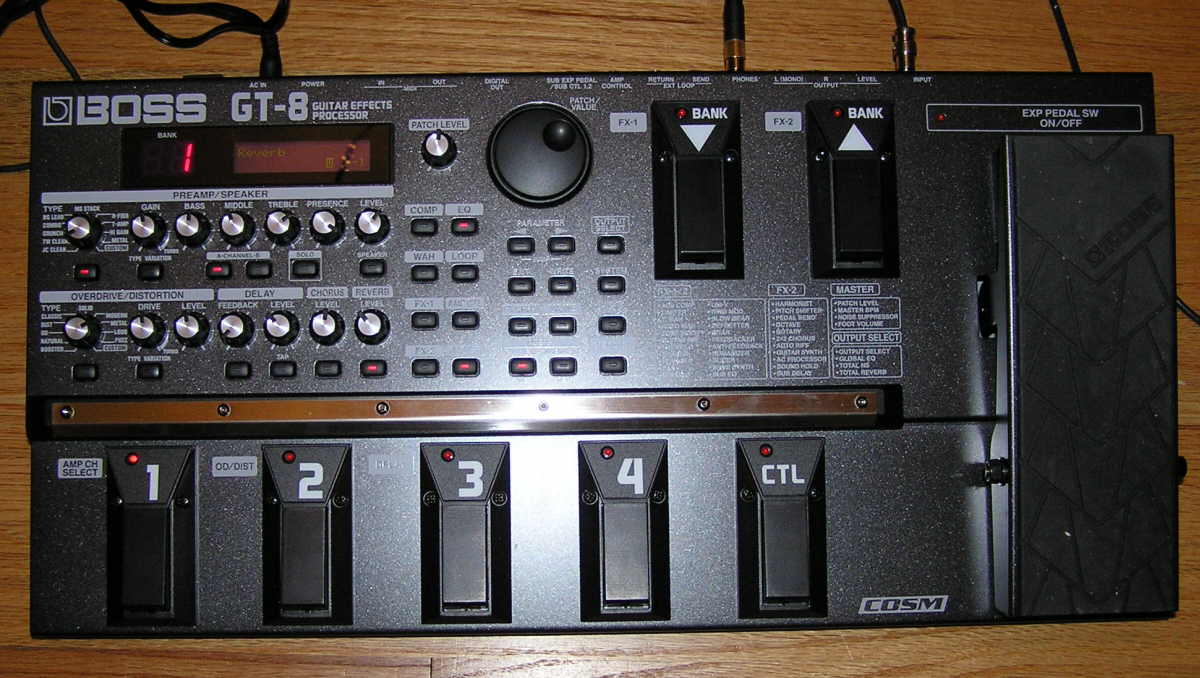This is my guitar effects processor. It lets me create sounds that i never would have even dreamed of, but when i hear them come out of the speakers, it really helps me to write a song in a certain feel. From the Reverb setting that is in the picture, which has a huge stadium sort of echo - to something very lo-fo (low- fidelity) that sounds tingy and small, very subdued. The Reverb is normally used for things like huge guitar solos or even just to make the Chorus sound "bigger" than the Verses.
However, there are a few down sides to using a huge guitar processor to model your sound after the feel you're going for. It's very much possible and somewhat EASY to lose yourself in all the programming and tweaking. But the plue to this is that, it REALLY DEVELOPS YOUR "EAR-TRAINING"! You learn to spearate the tones. You learn to pick out the drums - put them aside for a moment, then you can hear what the bass guitar or low end pitches and notes are doing.
See the process of hearing music in a new way depends on your ears. Just like the knowledge that you have now, someone else might not pickup on the details that you know to look, listen or feel for.
Check out Don Ellis (SOURCE: verbatim from http://www.wikipedia.org/)
===========
Don Ellis (July 25, 1934 - December 17, 1978) was an American jazz trumpeter, drummer, composer and bandleader. He is best known for his extensive musical experimentation, particularly in the area of unusual time signatures. Later in his life he worked as a film composer, among other works contributing a score to 1971's The French Connection and 1973's The Seven-Ups.
====
Legacy
While Ellis's explorations with elements of form and content in jazz were undeniably innovative, his delivery of these innovations has caused many to dismiss him as pretentious or gimmicky. He used to explain to his audience how certain time signatures were divided, often with humorous twists (like joking that "33 222 1 222" is "just the area code"); his sense of humor often caused critics to think he didn't take his own music "seriously".
However, evidence shows that Ellis was a serious and dedicated musician who not only had high performance standards, he also placed great importance on teaching music. He formed a youth band in Los Angeles, led by Glenn Ferris. Sidemen such as Stu Blumberg further credit Ellis for preparing them for the idiosyncrasies of unconventional music in film soundtracks. Tenor player Jim Snodgrass remarked, "I think in many ways Don was a teacher. One thing his music taught me was that I could play anything I absolutely had to."
In spite of this, the popularity of Ellis's music waned considerably after his death. Besides Tom Scott, John Klemmer, Glenn Ferris and Milcho Leviev, few of his former sidemen have achieved a significant level of fame, and Ellis's compositions are rarely played. Columbia Records, responsible for originally releasing seven of Ellis's albums, only reissued Electric Bath (Ellis's biggest seller) in 1997 and stubbornly refused to reissue any others. The bulk of his recordings were unavailable until 2000, when labels like Koch Jazz, Wounded Bird and Mighty Quinn Productions started reissuing Ellis's big label releases. Today, almost all of his albums have been reissued on CD and are readily available.






No comments:
Post a Comment